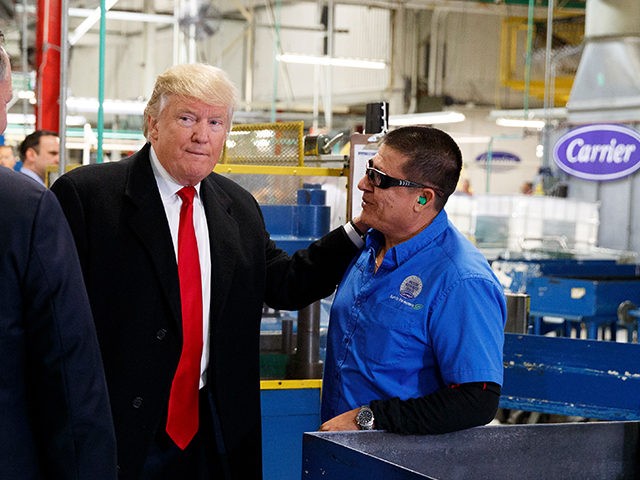The economy added nearly 300,000 private sector jobs in the first full month of Donald Trump’s presidency–blowing away the expectations of economists and defying many so-called experts who predicted Trump’s presidency would lead to an economic slump.
Employment in the private sector rose by 298,000 jobs in February, according to ADP and Moody’s Analytics. Economists surveyed by ADP had expected 190,000 jobs.
President Trump ran a campaign that promised job creation–and the American people strongly believed Trump would be better on jobs than Hillary Clinton. Expert opinion, however, was certain a Trump victory would kill jobs and cause a recession.
“The trade deficit will get larger and that means overall, you might save 100 jobs at Carrier, but overall the jobs in manufacturing we lost will get worse,” Nobel prize-winning economist Joseph Stiglitz told CNNMoney in January.
“If [Trump] is elected, I would expect a protracted recession to begin within 18 months. The damage would be felt far beyond the United States,” former Treasury Secretary Larry Summers wrote in a June 2016 op-ed in the Financial Times.
Summers was singing the same tune as recently as January. Speaking at the World Economic Forum in Davis, Switzerland, Summers warned that Trump’s policies would strengthen the Mexican peso against the U.S. dollar–and as a consequence cost thousands of U.S. jobs.
“It is a major change in the relative attractiveness of locating production activity in Mexico, versus locating it in the American heartland, and the consequence of that is measured not in the dozens or hundreds, but in the thousands or ten thousands or even hundreds of thousands of jobs,” he said, according to a CNN Money report.
Citigroup’s economists were perhaps even more gloomy. “A Trump victory in particular could prolong and perhaps exacerbate policy uncertainty and deliver a shock (though perhaps short-lived) to financial markets,” a team led by Citi Chief Economist Willem Buiter wrote in note reported on by Bloomberg News. “Tightening financial conditions and further rises in uncertainty could trigger a significant slowdown in U.S., but also global growth.”
Simon Johnson, the prominent Massachusetts Institute of Technology economist, argued that a “big adverse surprise – like the election of Donald Trump in the US – would likely cause the stock market to crash and plunge the world into recession.”
Even when the stock market soared after Trump’s election, many were quick to point out that the “stock market isn’t the real economy” and that financial markets often appear to be irrational. Perhaps investors were happy because corporate earnings would benefit from tax cuts, some speculated, but Trump’s voters were bound to be disappointed when jobs failed to materialize.
Today’s jobs numbers are, however, the real economy. And they demonstrate that the notion that Trump’s policies–or mere uncertainty around policy making–would kill jobs appears to have been far off the mark. Far from pulling back, businesses hired just about the maximum number possible in a single month.
“Confidence is playing a large role,” Moody’s Analytics chief economist Mark Zandi told CNBC. “Businesses are anticipating a lot of good stuff – tax cuts, less regulation. They are hiring more aggressively.”
Dive deeper into the numbers and it becomes even clearer that Trump and the American people were far more prescient than expert opinion. While lower-productivity service-sector jobs dominated many past jobs reports, this report shows a notable shift toward a more balanced economy. Services added 193,000, with 66,000 coming from professional and business services. Goods producers added 106,000 jobs. Construction jobs grew by 106,000. Manufacturing jobs grew by 32,000. So much for the idea that America cannot grow its manufacturing sector again.
The health care sector was one supposed to be particularly hard hit. “As many as 200,000 jobs may be lost in the health-care sector over the next year and employers will slow investment as they wait to see Trump’s clear plan for reform, according to Chris Rupkey, chief financial economist for Bank of Tokyo-Mitsubishi UFJ Ltd. in New York,” Bloomberg News reported in December.
Instead, the economy added 38,000 health care jobs in February.
“February proved to be an incredibly strong month for employment with increases we have not seen in years,” Ahu Yildmaz, co-head of ADP Research Institute, said in a statement about the February report.
One of the things that was supposed to make robust job growth nearly impossible under Trump was the already low unemployment rate, which supposedly would make it impossible to produce the kinds of job growth Trump had promised. As a candidate, however, Trump argued that the unemployment rate was under-estimating the true state of joblessness in the country–and therefore the potential for renewing American job growth.
February’s job surge is even more extraordinary in light of widespread expectations that the Federal Reserve will raise interest rates when it meets next week. Interest rate hikes are generally seen as putting the brakes on the economy. Indeed, the prospect of rising rates was often cited by Trump’s critics as one of the reasons his jobs promises would fail.
Of course, this is merely one month’s data. Without a doubt, future jobs reports will come in with less eye-popping numbers. Some may even disappoint expectations. But February’s numbers make clear that employers in the U.S. don’t foresee a slump coming.
They see a boom coming and are hiring as fast as they can to be ready for it.

COMMENTS
Please let us know if you're having issues with commenting.